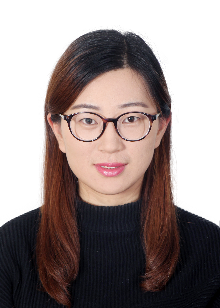| Prof. Yanling ZhangDeputy DirectorDepartment of TourismBusiness School Tianjin University of Finance and Economics Brief: Professor Yanling Zhang holds a Ph.D. in Management from Technische Universität Bergakademie Freiberg, Germany. She currently serves as Deputy Director of the Department of Tourism, Business School, Tianjin University of Finance and Economics. |
| Ruifeng MuAssociate Research Fellow,CuratorNational Museum of China, ChinaBrief: I was graduated with a Doctor’s degree from the Department of Art History and Theory, Academy of Arts & Design, Tsinghua University. During my doctoral studies, I mainly focused on the history of Chinese painting, especially the painting history of the Tang Dynasty, as well as the history of painting theory and criticism. After obtaining my Doctor’s degree, I entered the Postdoctoral Research Station of the Academy of Arts & Design, Tsinghua University. During this period, I was invited to study as a visiting scholar at the Victoria and Albert Museum in the United Kingdom for three months. During my postdoctoral research, I mainly focused on the museum field, especially university museums’ operation, management, research and exhibitions in the United Kingdom. I had visited dozens of university museum institutions in UK. In 2018, after completing my postdoctoral research, I worked in the Collection Preservation Department of the National Museum of China. I mainly engaged in the preservation, arrangement and research of collected calligraphy and painting cultural relics. My research directions include the history and theory of Chinese calligraphy and painting, the history of art criticism and collection, and museology. . |
| Assoc. Prof. Sikandar Ali QalatiLiaocheng University, China Brief: Dr. Sikandar Ali Qalati is a highly recognized scholar listed among the world’s top 2% scientists. He serves as an Associate Professor at the School of Business, Liaocheng University, China, and previously at Jiangsu University. His research focuses on green human resource management, environmental sustainability, artificial intelligence, and organizational innovation. Dr. Qalati has published over 60 SSCI/SCI-indexed papers in top-tier journals such as Business Strategy and the Environment, Journal of Innovation & Knowledge, and Journal of Cleaner Production. His pioneering work on sustainable AI capabilities and executive commitment to environmental performance contributes to shaping the dialogue on responsible digital transformation and green competitiveness across emerging economies. Currently, Dr. Qalati is working with professors from well-recognized universities around the world, such as the University of Porto (Portuguese); the University of Illinois at Urbana-Champaign (United States); Dhofar University (Oman); King Faisal University (Saudi Arabia); Kuwait University (Kuwait); University of Punjab (Pakistan). Additionally, supervising students globally like in INTI International University (Malaysia), University of Sadat City (Egypt), Universiti Malaya (Malaysia), Jiangsu University (China). Speech Title: Social media usage by Small and Medium-Sized Enterprises in developing countries Abstract: Although larger firms globally can adopt social media and other internet-based strategies without requiring additional resources, social media can be employed by small and medium-sized enterprises (SMEs) because of its low cost, technical manageability, ease of use, and its capability to connect with and reach an ample number of consumers. The adoption of social media is constantly growing in enterprises in developing countries and is currently considered a key strategy in SMEs; conversely, SMEs are using several social media platforms. It is one of the most popular choices for small businesses in developing countries because it facilitates rapid and clear communication between two parties (e.g., firm-customer relationship), letting companies to understand customer needs and respond competently and proactively to these needs. Social media is also a somewhat low-cost choice for analytics, conversion tracking, content management, automated publishing, and customer targeting. Social media usage by SMEs is regarded as crucial in the entrepreneurship and business literature in developed and developing countries. It also enables SMEs to maintain their competitive position by strengthening customer relationships, positively impacting sales performance. |
| Assoc. Prof. Mashitah HamidiUniversiti Malaya, Malaysia Brief:Mashitah Hamidi is an Associate Professor of Migration Studies at the Department of Social Administration and Justice, Universiti Malaya. Her research interest is focusing on migration and displacement groups. She is currently a Head of Department of Social Administration and Justice and Deputy Head of Population and Migration Research Center, Universiti Malaya. She obtained her Bachelor of Science (Hons) in Human Development and Masters in Human Resource Development (MHRD) from Universiti Putra Malaysia. She pursued her PhD in Sociology at La Trobe University, Australia. Her areas of research include development studies, social integration, advocacy and social services systems of transnational labor and gendered migration, stateless and refugee groups. She handled numerous research include Indonesian Women Migrants in Malaysia, Stateless Children in Kuala Lumpur, Rohingya refugee community. She is a permanent committee member of ATIPSOM for the Malaysia Crime Prevention Foundation (MCPF). Mashitah is involved as a Consultant team at National level projects such as Malaysian Social Workers Knowledge and Practice (2018), Inclusive Campus Framework for Disable Students ‒ MyUOKU (2019) and Sarawak Well-Being Index (2019-2020). |




